|
|
|
Editor: Irene Delgado-Fernandez.
|
|
Co-Editor: Margarita Stancheva
|
|
|
|
|
Objectives: The Commission on Coastal Systems encourages the study of coastal systems throughout the world. The Commission sponsors and supports activities leading to the exchange of information regarding coastal systems among our members and throughout the IGU at large. The focus of attention is on interactive systems, both human and physical, and the areas of inquiry include issues such as sea-level rise, land-use changes, estuarine resources, coastal tourism and shoreline development, coastal recreation, and coastal zone management. The Commission will make concerted efforts to emphasize issues of Global Change.
|
|
|
|
|
MESSAGE FROM THE CHAIR
|
|
|

|
|
Prof. Colin Woodroffe, University of Wollongong, Australia
|
|
I am pleased to be able to start 2024 with the launch of the new-look newsletter for the Commission on Coastal Systems. I would like to express my thanks to Irene Delgado-Fernandez for developing this newsletter and helping Margarita and myself to compile its contents.
The Commission on Coastal Systems, as one of more than 40 commissions sponsored by the International Geographical Union, fosters international collaboration in coastal research, teaching, and outreach that helps to understand our coastlines and to promote the sustainability of coastal ecosystems and coastal communities. Coasts are undergoing change; much of this is natural, but increasingly we recognise the magnitude of anthropogenic impacts and the effects that climate change is having. I would like to echo the words of IGU President, Michael Meadows, in drawing attention to the special responsibilities that we have to educate our students and the broader community about the nature and causes of these changes, and continue to produce the kind of high-quality research that can underpin appropriate policies and strategies toward both mitigation and adaptation.
I draw your attention to several important dates in January; abstract submission for coastal sessions at EGU in Vienna closes on 10 January, and for IGC in Dublin closes on 12 January. You may also be interested in a series of Geochron workshops that IGCP725 is holding on 18 January (requiring registration by 10 January). Details of these, and several other meetings can be found below.
I hope that this will be a rewarding year for coastal researchers, and I trust that you will find a range of items of interest in this newsletter. We welcome feedback on the format of the newsletter, and will be pleased to make a pdf copy available to anyone who prefers to receive the newsletter in its previous form. Past newsletters are archived on our website, which has a range of other resources: visit https://igu-coast.org/ or email Irene ([email protected]) or myself ([email protected]).
|
|
|
|
|
PHOTO OF THE ISSUE
|
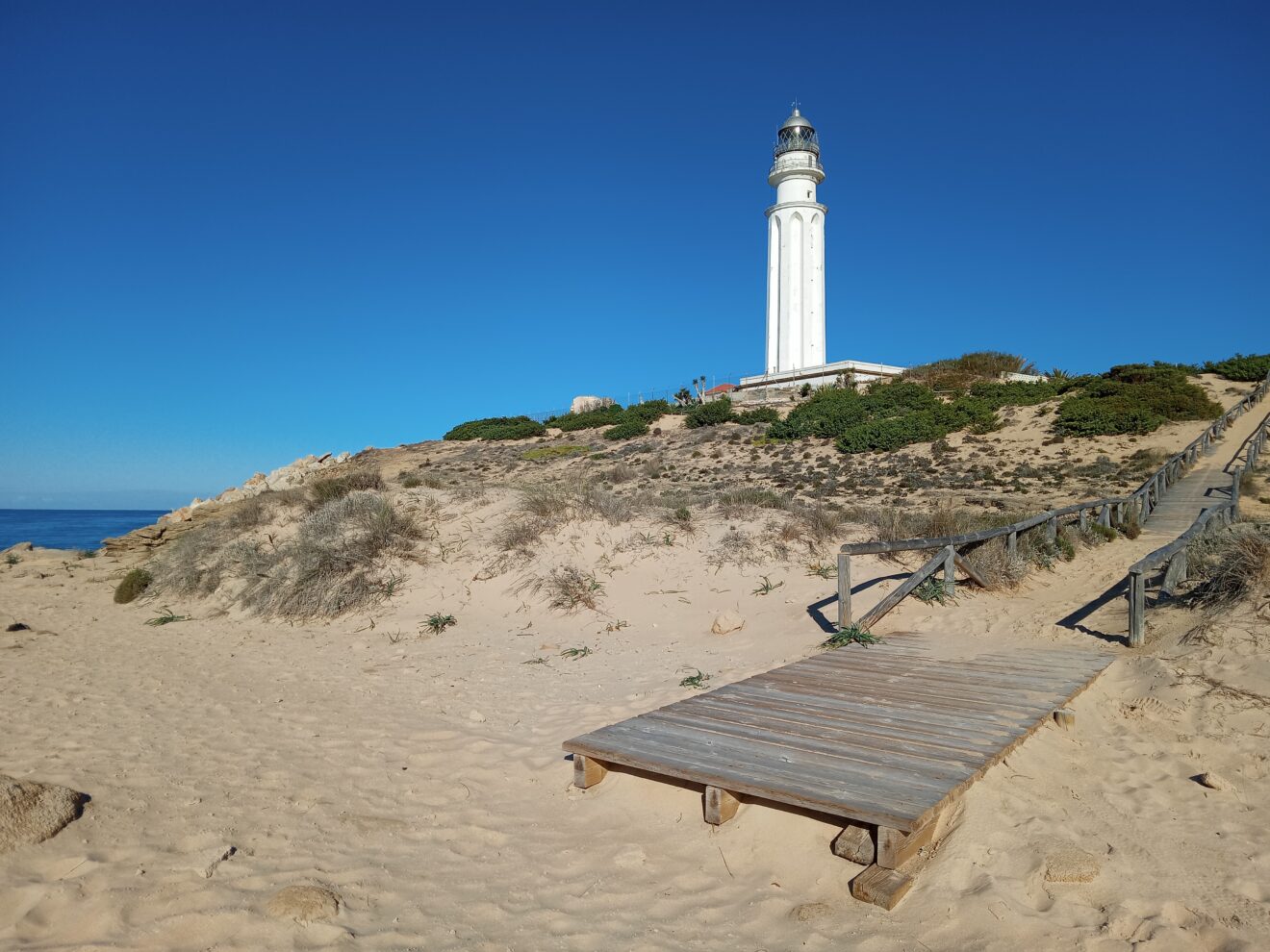
|
The Trafalgar Lighthouse, located on the southern coast of Spain in the province of Cádiz, stands as a beacon overlooking the Strait of Gibraltar and the Atlantic Ocean. This iconic structure not only serves as a navigational aid but also carries a rich history and offers panoramic views of the coastline. Photo credit: Irene Delgado-Fernandez, University of Cádiz (Spain).
|
|
|
|
Send us your coastal photos and we'll feature them in future newsletters!
|
|
|
|
|
MEETINGS / SESSIONS SPONSORED OR CO-SPONSORED BY THE COMMISSION ON COASTAL SYSTEMS
|

|

|
|
The 35th International Geographical Congress will take place in Dublin, Ireland, on August 24-30, 2024. The theme of the congress is ‘Celebrating a World of Difference’. The conference is a unique opportunity to share the best of global geographic research, share common challenges and opportunities, and connect with colleagues from across the world.
|
|
|
This upcoming conference is set to be bustling for our coastal colleagues, featuring four submitted coastal sessions, one field trip, and a meeting of the Sea Level and Coastal Change research group. Find all the details below!
|
|
|
CCS-SPONSORED COASTAL SESSIONS [C.06 COASTAL SYSTEMS CONFERENCE TOPIC]
|
-
Climate change and local knowledge in coastal and island contexts
Organized by Miss Maeve McGandy (University of Galway), Miss Shirley Howe (Maynooth University; ICARUS Climate Research Centre).
This session seeks to explore the role of local knowledge in understanding and addressing climate change within coastal and island contexts. While ‘the local’ evades a singular geographical definition, we argue that learning with and from local cultures, dynamics, knowledges, and practices is vital within contemporary climate change research, meanwhile acknowledging and attending to the historical marginalization of such knowledge forms within science, policy, and practice. Coastal and island communities are recognised as highly vulnerable to climate change where past, current, and potential future impacts can include erosion, flooding, ecosystem loss, salinity incursion, infrastructure damage, and displacement. In such contexts, place-based climate change responses can present as a complex intermingling of the cultural, ‘non-human’ nature, and the physical. Locally attuned understandings are therefore central to responding to climate-related challenges, as is increasingly recognised within policies and agendas across scales. We invite submissions focusing on local and indigenous perspectives and responses to climate change within coastal or island community settings. Cross-disciplinary and Early Career Researchers are especially encouraged to submit. Topics could include but are not limited to: Socioecological relationships; Community-led initiatives in adaptation, mitigation and sustainability; Locally identified pressures on resilience; Understandings of risk; History, heritage and culture in an era of climate change.
|
-
Managing coastal hazards and minimizing vulnerability
Organized by Dr Ritika Prasad and Shachi Rai (University of Lucknow).
A coastal hazard is the occurrence of a phenomenon that has the potential to harm or destroy infrastructure, buildings, or natural ecosystems. They all differ in some way and take place on various time and space scales. The likelihood that coastal regions would be subject to coastal hazards is made more likely by the possibility of rising sea levels as a result of climate change. The vulnerability of coastal areas has dramatically grown as a result of population growth, urbanization, and migration closer to the coast. Therefore, managing coastal hazards is essential to reduce risk for populations located nearer to the coast. It is particularly urgent because many small island nation-states and developing littoral countries with high population densities are hit much harder due to the lack of resources and assets to handle the calamity. Therefore, managing coastal hazards is a topic that coastal states worldwide are keen to discuss. To reduce their vulnerability to natural disasters, local communities and governments must firmly commit to operating in accordance with the Sendai Framework's (2015- 2030) principles. Researchers are welcome to discuss case studies, models, ideas, and techniques in this session that place a focus on acquiring the abilities and knowledge required to effectively anticipate, counteract, and recover from coastal disasters. It will also provide a place for discussion to increase understanding of the problem and identify potential solutions.
|
-
Transdisciplinary science for near-future habitable coasts
Organized by Prof Paolo Ciavola (Università di Ferrara), Prof Iris Moeller (Trinity College Dublin), Prof Tom Spencer (University of Cambridge), Dr Anne Marie O'Hagan (University College Cork).
Coastal form and function results from a mosaic of human, physical, chemical, and biological processes, operating over a range of intertwined time and space scales. But understanding these complexities is vital; how in a time of climate crisis will human health, well-being and livelihoods at the coast be maintained in the near future? Recently, more widespread and detailed monitoring of coastal dynamics, aided by advances in digital technologies and earth observation, have led to a greater appreciation of the locally specific manifestations in which otherwise global drivers (e.g. changes in global mean temperature and sea level rise) are intricately meshed with both particular coastal settings and human actions at the sub-regional scale. In the face of often severe coastal management challenges, these developments could be seen as the necessary foundation for better informed, innovative, equitable, sustainable, community-focused, and co-created local and regional flood and erosion risk control, wise resource use, and ecosystem restoration and conservation. Restricted resources and/or unequal distribution of knowledge, power, and finance, however, may be some of the reasons why the potential of this increase in technical and process know-how has not (yet) been realised in many regulatory and management regimes. We invite contributions to this session that explore the notion that stronger location-specific coastal dynamics knowledge, and its appropriate application, provides the way forward towards more sustainable coastal human-environment interactions at a time of unprecedented coastal societal challenges. Contributions that challenge this notion and explore alternative perspectives are also welcome.
|
-
Managing, protecting, and conserving of the coastal natural resources
Organized by Prof Colin Woodroffe (University of Wollongong), and Dr Bhanwar Vishvendra Raj Singh (Mohanlal Sukhadia University).
Managing, protecting, and conserving coastal natural resources is crucial for maintaining the health and sustainability of coastal ecosystems, which provide numerous benefits to both the environment and human communities. Coastal areas are among the most biologically diverse and economically valuable regions on Earth, but they are also highly vulnerable to various threats, including pollution, habitat destruction, climate change, and overexploitation of resources. These threats are related to the management and sustainability of natural resources. Also, these pressures arise from a combination of environmental, social, and economic factors, and they can have far-reaching consequences for both the coastal ecosystems and the communities that depend on them. In this condition, there are a few key strategies and principles for effectively managing coastal natural resources such as Integrated Coastal Zone Management (ICZM), Protected Areas, Sustainable Fishing, and Aquaculture, Coastal Habitat Restoration, Pollution Control, Climate Change Adaptation, Community Engagement, Scientific Research, and Monitoring, International Cooperation, Education and Outreach, etc. By adopting these strategies and principles, we can work towards preserving our coastal environments' ecological integrity and long-term sustainability. This session highlights coastal threats to natural resources requires a combination of scientific research, sustainable resource management practices, policy development, and international collaboration. Coastal resilience and sustainable development are essential to mitigate the adverse impacts on the environment and coastal communities' livelihoods.
|
|
|
|
CCS-SPONSORED FIELD TRIP - DUBLIN BAY & IRELAND'S EAST COAST
|
In addition to the four coastal sessions above, the Commission on Coastal Systems sponsors a Coastal Field Excursion on the 24th of August 2024, organized by Prof. Iris Moeller (Trinity College Dublin).
|
If you are attending the International Geographical Congress 2024, plan your travel so that you can attend our one-day coastal field excursion! The excursion will take place on 24th August 2024 from 09:30 – 17:00. You can be dropped off in good time for the Opening Ceremony of the Congress. It will introduce participants to some of the flood and erosion-prone low-lying coastal environments of Dublin Bay and to an example of Ireland’s east coast bar-built estuaries. This coast is both highly urbanized and protected under international and national nature conservation designations, offering a plethora of challenges for the 21st Century and beyond, as human pressures need to be negotiated around space required for nature.
Registrations for the trip will open in April-May 2024. To register interest and be included in any further email circulations with registration details, as well as for questions regarding this event, please contact Iris Möller at [email protected].
|

|
|
Sandy cliff erosion, Portrane beach, 09/2021 (left); Salt marshes of Rogerstown estuary (right).
|
|
Photos by Iris Möller (TCD).
|
|
|
SLaCC MEETING [SEA LEVEL AND COASTAL CHANGE RESEARCH GROUP]
|
Finally, there will be a Sea Level and Coastal Change (SLaCC) meeting coinciding with the field trip to Dublin Bay, hosted by Robin Edwards and Iris Moeller at Trinity College Dublin. The meeting aims to bring together scientists from across the UK and NW Europe to discuss their work in all aspects of sea level and coastal changes. Organizers welcome cross-disciplinary engagement at the meeting across sea level and coastal processes, encompassing research that explores past, contemporary and future changes.
|
|
|

|
|

|
|
The Commission on Coastal Systems is a proud sponsor of two well-established sessions at EGU24, taking place within the broader Geomorphology programme, and specifically under the GM9 Coastal and Submarine geomorphology sub-group. The first session, titled Coastal morphodynamics: nearshore, beach, and dunes, delves into the intricate dynamics shaping these coastal features. The second session, Coastal Zone Geomorphological Interactions: Natural and Human-Induced Driving Factors, focuses on the interactions between natural processes and human activities within the coastal zone. Both sessions promise insightful discussions and contributions to the understanding of coastal systems at EGU24.
|
|
|
|
Conveners:
Irene Delgado-Fernandez (U. Cádiz)
Derek Jackson (Ulster U.)
Emilia Guisado-Pintado (U. Sevilla)
Susana Costas (U. Algarve)
Melanie Biausque (U. University)
Solicited talk by Dr Mitchell Harley (UNSW)
|
|
|
|
|
Conveners:
Hannes Tõnisson (Tallinn U.)
Margarita Stancheva (CCMS)
Andreas Baas (King’s College London)
Riko Noormets (U. Centre Svalbard)
Rosa Molina Gil (U. Cádiz)
|
|
|
|
|
|
The deadline for EGU24 abstract submission is 10th January 2024!
|
|
|
|
|
REPORTS ON MEETINGS
|

|
The First Annual Meeting of the UNESCO-funded IGCP 725 Forecasting Coastal Change was held in Florianopolis, Brazil in October of 2023. This meeting was organized by the IGCP 725 team and in particular, Jessica Pilarczyk, Chris Hein, and local host Antonio Klein. The meeting was a great success and was attended by participants from more than 12 countries. Two days of excellent talks and posters were followed by three days exploring coastal geology, geomorphology, and coastal management issues of this beautiful coastline. The talks and posters covered a range of themes with the aim of bringing together modelling and geological approaches summarized in the phrase “from cores to code”.
Field visits were made to the Holocene prograded barriers of Tijucas and Pinheira and the dunes and estuary entrance at Guarda do Embau. We also explored the coastline of Ilha de Santa Catarina where we observed headland bypassing and overpassing and saw how longshore drift dynamics are creating coastal management challenges in the region around Ingleses and Jurere. Next year’s IGCP 725 meeting will be held in the Philippines in October 2024.
|
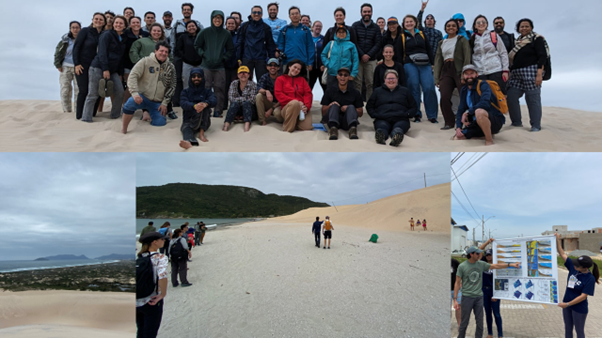
|
|
Participants of the IGCP 725: Forecasting Coastal Change, Florianopolis (Brazil).
|
|
Photos and text submitted by Thomas Oliver (UNSW Canberra).
|
|
|
|
|
MEETINGS WITH COASTAL INTEREST
|

|
The Young Coastal Scientists & Engineers Conference (YCSEC) series bring together early-career researchers and practitioners, such as PhD students, postdoc researchers & recently qualified professionals, with expertise and interests in coastal environments. It provides a welcoming and supportive environment to present and discuss research and share good practice.
There are three branches of the conferences which are a great opportunity to interact with a small community of researchers:
|
-
YCSEC – UK, to be held at HR Wallingford, Oxfordshire (UK), 26-27 March 2024
-
YCSEC - Americas, to be held in Quebec City, Canada, 4-6 June 2024
-
YCSEC - Australasia, with plans to be released soon on the website.
|
|
|
|
|
|
Explore the YCSE conference websites by clicking on their logos!
|
|
|

|
|
|
The workshop Mining the Historical Coastal Record will be held on 18 January 2024. This workshop is free and fully virtual. Following the theme of IGCP725, it will cover the basics “from cores to code”. Topics will include the use of historical maps and modern imagery, LiDAR, and satellite remote sensing to map and monitor coastal change, the cultural context of data, and the use of microplastics and surface-elevation tables (SETs) to explore short-term coastal change.
|
|
|
The Geochron January III will follow the same format as past events on Radiocarbon (January 2022) and Beyond Radiocarbon (January 2024):
-
Advance Recorded Presentations: Twelve, 15-20 minute pre-recorded presentations to be posted one week in advance of the workshop (by 11 January 2024) on the IGCP 725 YouTube site (a link will be emailed to all registrants).
-
Breakout Sessions: Two synchronous sets of breakout sessions on 18 January. Each will include a 5-minute recap talk by each expert, followed by the opportunity for attendees to interact with topical experts and discuss their own data/project needs and questions. Breakout Session #1: 00:00-01:00GMT [UTC]; Breakout Session #2: 15:00-16:00GMT [UTC], both on 18 January.
|
During each breakout session time slot, we will have active 2–3 concurrent Zoom rooms. Each will have 2–3 experts plus a host. Although not all presenters will be present in Zoom rooms at both breakout sessions, experts will be arranged to ensure diverse topical coverage at both sessions. Registrants will receive Zoom information for all sessions and Zoom rooms via email in advance of the workshop. Registrants will be able to move between the Zoom sessions and are welcome to attend both sets of breakout sessions. Recordings of all presentations and breakout session Zoom rooms will be made available to all pre-registered attendees.
|
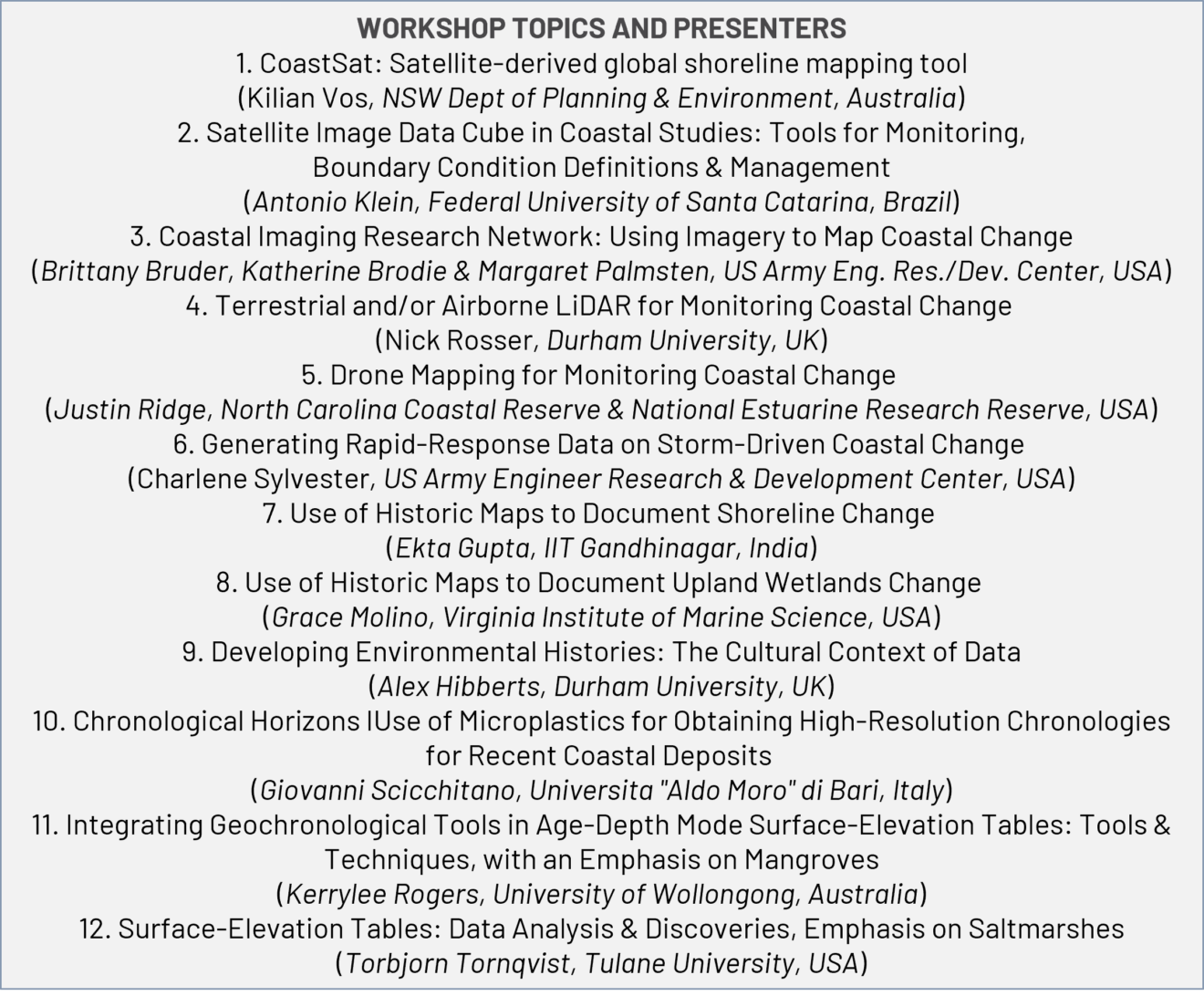
|
|
|
|
|
|
Item submitted by Jessica Pilarczyk (Simon Fraser University) and
|
|
Christopher J. Hein (Virginia Institute of Marine Science).
|
|
|

|
|
|
|
|
The University of Doha for Science and Technology (UDST) and the Coastal Education and Research Foundation (CERF) are delighted to invite you to participate in the International Coastal Symposium (ICS2024), to be held from 22nd – 26th September 2024 under the theme:
Coastlines under Global Change
|
|
|
The International Coastal Symposium (ICS) is currently celebrating its 17th edition and 34th anniversary. This meeting in particular will be making a historic milestone. For the very first time, the ICS will take place in the Middle East, with Doha, Qatar, as its distinguished host. The ICS2024 will be hosted by the University of Doha for Science and Technology (UDST), which was recently accredited as a UNESCO University. Symposium highlights include:
|
Peer-Reviewed Publication: Accepted papers will be featured in a dedicated Special Issue of the Journal of Coastal Research (JCR), a renowned and peer-reviewed journal dedicated to coastal and marine science.
Multi-disciplinary Focus: The Symposium embraces a broad spectrum of subthemes, ensuring a comprehensive exploration of coastal issues and solutions. We invite researchers and experts to contribute to the Symposium by submitting their original research papers, case studies, and reviews in alignment with the Symposium subthemes:
|
|
|
1. Coastal Management, Policy, and Planning
2. Coastal and Marine Engineering
3. Decarbonization of Marine and Maritime Industry
4. Climate Change and Sea-Level Rise
5. Coastal Evolution and Shoreline Change
6. Coastal Geology and Geomorphology
7. Hydrodynamics and Modeling
8. GIS and Remote Sensing
|
|
9. Coastal Hazards and Extreme Storms
10. Coastal Biology and Ecology
11. Rivers and Estuaries
12. Beaches, Dunes, and Coasts
13. Coastal Tourism
14. Shelf Seas, Lagoons, and Oceanography
15. Ports and Inlets
|
|
|
|
Abstract submission deadline: 7 February 2024
For more information, please visit the Symposium's official website: www.ics2024.org
|
|
|
|
|
|
HIGHLIGHTS & FEATURES
|

|

|
Future Earth Coasts and the IGU Commission on Coastal Systems are delighted to announce their partnership. Future Coasts is a global research network of Future Earth, a platform for translating sustainability knowledge into action that includes a number of United Nations agencies, intergovernmental bodies, and organizations such as the International Council for Science.
This collaboration marks a significant step towards addressing the pressing challenges faced by coastal areas in the context of global change. Future Earth Coasts and the Commission on Coastal Systems believe that addressing complex coastal challenges requires a diverse and engaged community. The partnership aims to create a platform for coastal researchers, experts, and practitioners to come together, share their insights, and collectively work towards safeguarding coastal environments for future generations.
With this partnership between Future Earth Coasts and the Commission on Coastal Systems, we look forward to a future where coastal systems are thriving, resilient, and capable of sustaining both human societies and natural ecosystems. Together, we will listen, understand, and act to safeguard our precious coastal heritage for generations to come.
|
|
|
|
|
|
|
A Special Issue is currently open to submissions on topics related to coastal morphodynamics and interdisciplinary approaches to exploring coastal zones. Full papers are due on 1 April 2024.
Guest editors are CCS Steering Committee member Dr. Toru Tamura (National Institute of Advanced Industrial Science and Technology [AIST], Japan), Prof. Keiko Udo (Tohoku University, Japan), and Dr. Janaka Bamunawala (Tohoku University, Japan).
|
|
|
Coastal morphodynamics not only constitutes a basis for coastal engineering but also is highly relevant to diverse disciplines, such as geology, geomorphology, geophysics, ecology, agriculture, and archaeology. For example, long-term accumulations of coastal sediments have been subject to a range of analyses as archives of past coastal environments and/or responses to extraordinary events, including earthquakes, tsunamis, and storm surges, and as analogs of hydrocarbon reservoirs. Coasts also provide habitats for diverse faunas and floras, which grow and evolve in interactions with coastal morphodynamics. Outcomes from different disciplines are thus integrated to potentially provide valuable insights into coastal morphodynamics that are not achieved solely by conventional approaches to coastal engineering. In this special issue, we are interested in interdisciplinary contributions to the understanding of coastal morphodynamics that are explicitly or potentially beneficial to coastal engineering. Such contributions may include but are not limited to research on the long-term evolution of coastal systems, geoscientific characterization of sediment provenance and transport, and interaction of coastal biology with morphodynamics. Surveys with recent technological advances in relevant disciplines and their reviews are particularly welcome. We strongly encourage contributions from students and historically underrepresented groups in all relevant disciplines.
|
For information, please contact SI Editor, Dr.Toru Tamura ([email protected]).
|
|
|
|
|
|

|
The first two Geochron events organized by the IGCP Project 725 focused on tools and techniques for dating the long-term geologic record. Recordings of the publicly available talks can be found by clicking on the text below:
|
|
|
Take a look at the inaugural presentation from the January 2022 workshop by Gloria I. López, President of the Colombian Geological Society.
|
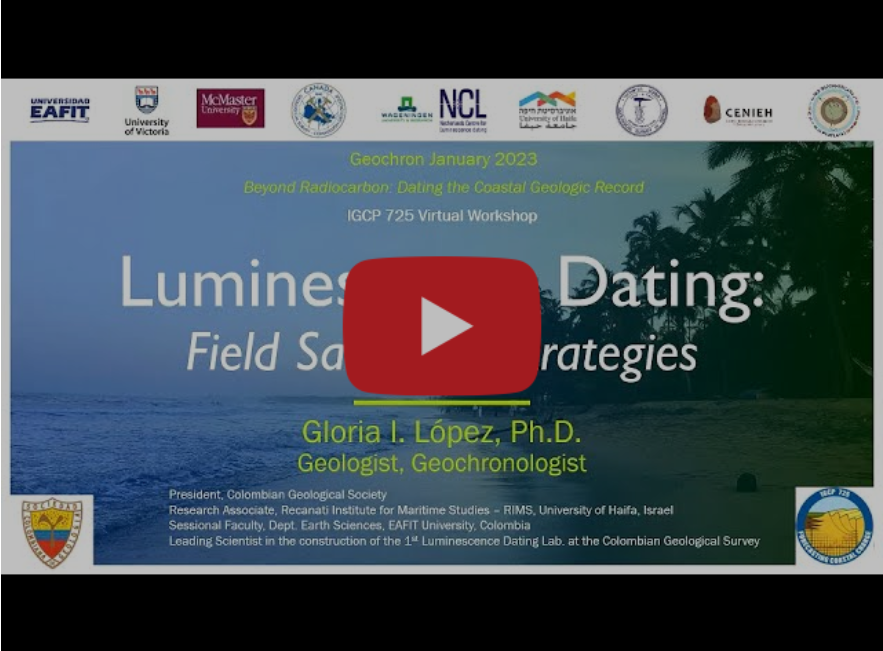
|
|

|
Brazil, endowed with a vast coastline and diverse marine ecosystems, acknowledges the pressing need for meticulous resource management. Marine spatial planning offers a structured approach to sustainably utilize marine resources, ensuring the longevity of fisheries and maritime activities while preserving environmental integrity. Marine spatial planning plays a vital role in striking a harmonious balance between economic pursuits and conservation imperatives. By designating areas for protection and sustainable use, Brazil aims to preserve critical habitats and safeguard its unique marine flora and fauna. In the face of escalating climate change impacts, Brazil emphasizes proactive measures. Marine spatial planning emerges as a strategic tool to identify vulnerable areas and implement adaptive strategies, fortifying coastal communities and ecosystems against a changing climate. To achieve an ecosystem-based MSP, Brazil defined the baseline for the MSP in the entire country setting the national vision and principles for our ocean. The Brazilian vision for MSP and the ocean is:
|
|
The Brazilian marine territory will be healthy, biodiverse, resilient, secure, and productive, driving sustainable, equitable, and democratic development. This situation will be achieved through continuous, coordinated, and participatory planning and governance, considering the best scientific evidence, traditional knowledge, and best practices to ensure the maintenance of sovereignty, the conservation of socio-biodiversity and ecosystem services, sustainable economic development, social inclusion, environmental and climate justice, and the well-being of society.
|
|

|
|
Item submitted by CCS Steering Committee member Profa. Dra. Marinez Scherer (ICZM and MSP Coordinator, Ministry of the Environment & Head of the ICZM Laboratory (LAGECI), UFSC, Brazil).
|
|
|

|
Have you explored the wealth of resources available on the Commission on Coastal Systems website? These encompass diverse datasets spanning world population statistics, engaging podcasts, connections to various coastal associations, an array of informative videos, and community-driven initiatives. There's a wide spectrum of valuable content waiting for you!
|
|
|
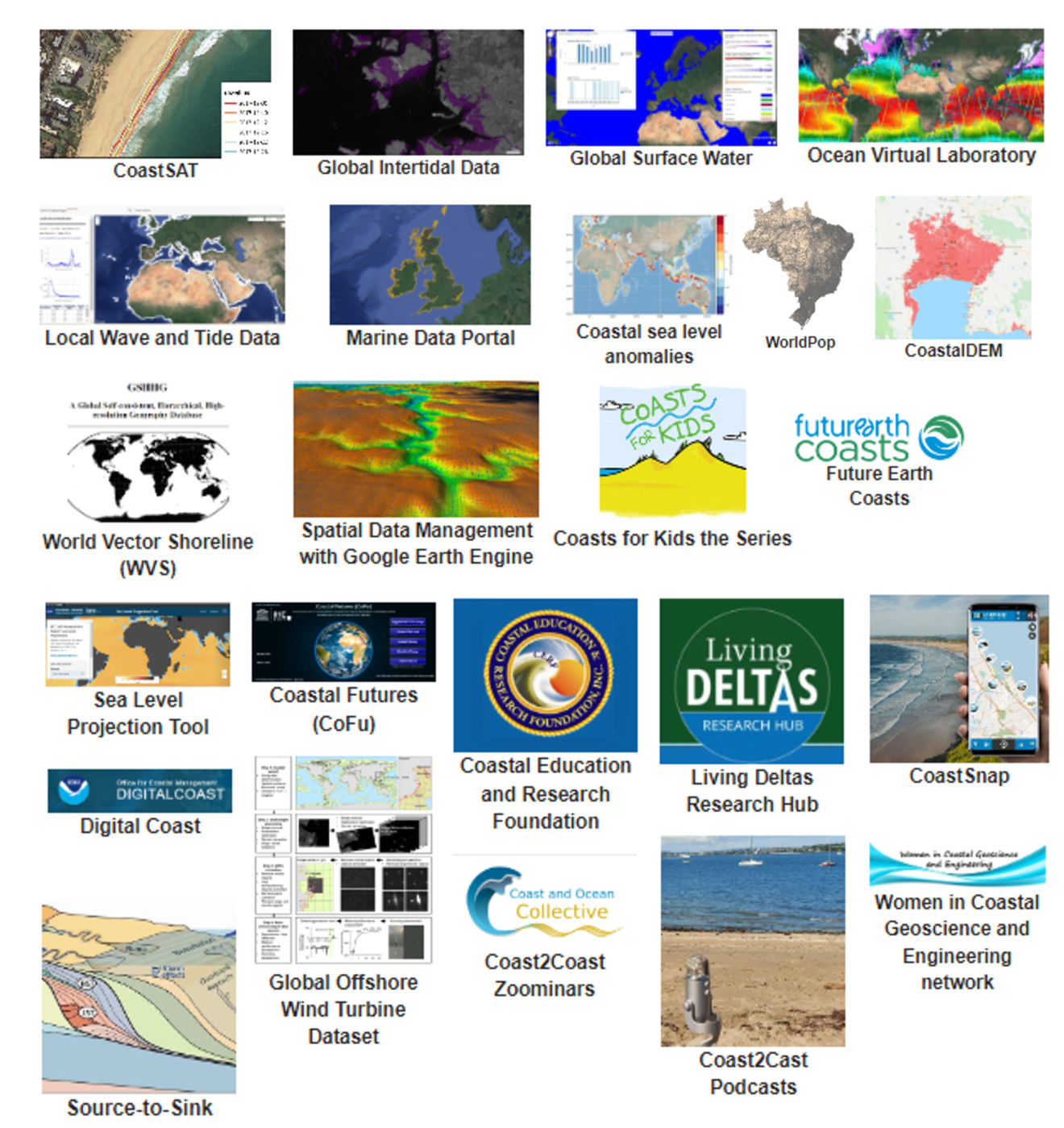
|
|
|
|
BOOKS AND REPORTS ON COASTAL AND MARINE TOPICS
|

|
|
|
|
|
Spanning pages 207 to 229, this chapter serves as a valuable resource for lectures introducing coastal systems as a research subject, offering insights into evolving methodologies and up-to-date knowledge on coastal issues amidst the backdrop of global changes.
|
|
|
|
|
|
Over the past few months, a series of Special Issues have been published, encompassing a wide spectrum of coastal topics. Collectively, they contribute to over 50 new articles, offering diverse insights into various aspects of coastal environments and processes.
|
|
|
-
Coastal Hazards in Africa: monitoring and management. Published in the Journal of African Earth Sciences. Guest editors: Abdelmounim El M'rini, Driss Nachite, and Mohamed Maanan.
|
|
|
-
Sustaining Coastal and Marine Environments in the Anthropocene. Published in the Journal of Coastal Conservation, Planning, and Management, arising from the CCS session at the IGC 2021. Guest editors: Colin Woodroffe, Margarita Stancheva.
|
|
|
-
Coastal Systems: Monitoring, Protection and Adaptation Approaches. Published in the Journal of Marine Science and Engineering. Guest editors: Niki Evelpidou, Anna Karkani, and Miltiadis Polidorou.
|
|
|
-
Applications of Structure - from - Motion Photogrammetry in Coastal and Marine Studies. Published in the journal Geosciences. Guest editors: Rafael Carvalho, Javier Leon and Luis Conti.
|
|
|
The following Special Issues are currently in production:
|
|
|
-
Coastal Hazards in Africa: Processes, Vulnerability and Management. A second SI arising from the second conference is in preparation for the journal Estuarine, Coastal and Shelf Science. Guest editors: Bronwyn Goble, Carlos Loureiro, Errol Wiles.
|
|
|
-
Learning from Geomorphological Adaptation of Coasts at Different Time Scales. In preparation for the Journal of Marine Science and Engineering. Guest editors: Susana Costas and Duncan FitzGerald.
|
|
|
|
|
|
|
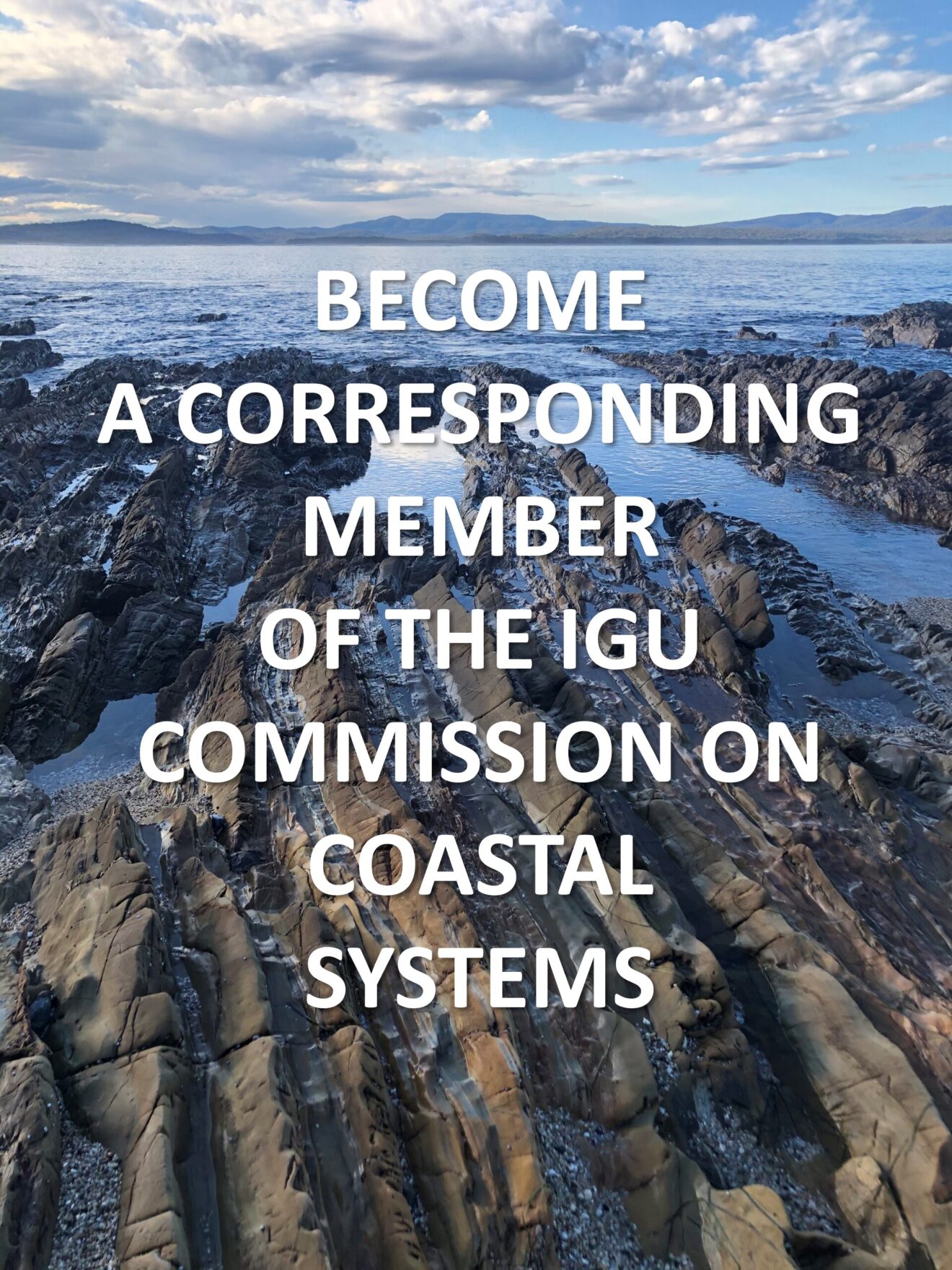
|
|
We kindly ask for your assistance in sharing this newsletter with individuals you think might find its content valuable. This newsletter will be sent out twice a year, predominantly via email. We encourage you to forward this edition to contacts in your coastal network and invite them to subscribe by clicking on the link below.
|
|
|
|
|
|
|
|

|
 
|
|
Click HERE to dowload a PDF copy of this Newsletter.
|
|
|
|
|
|
|
|